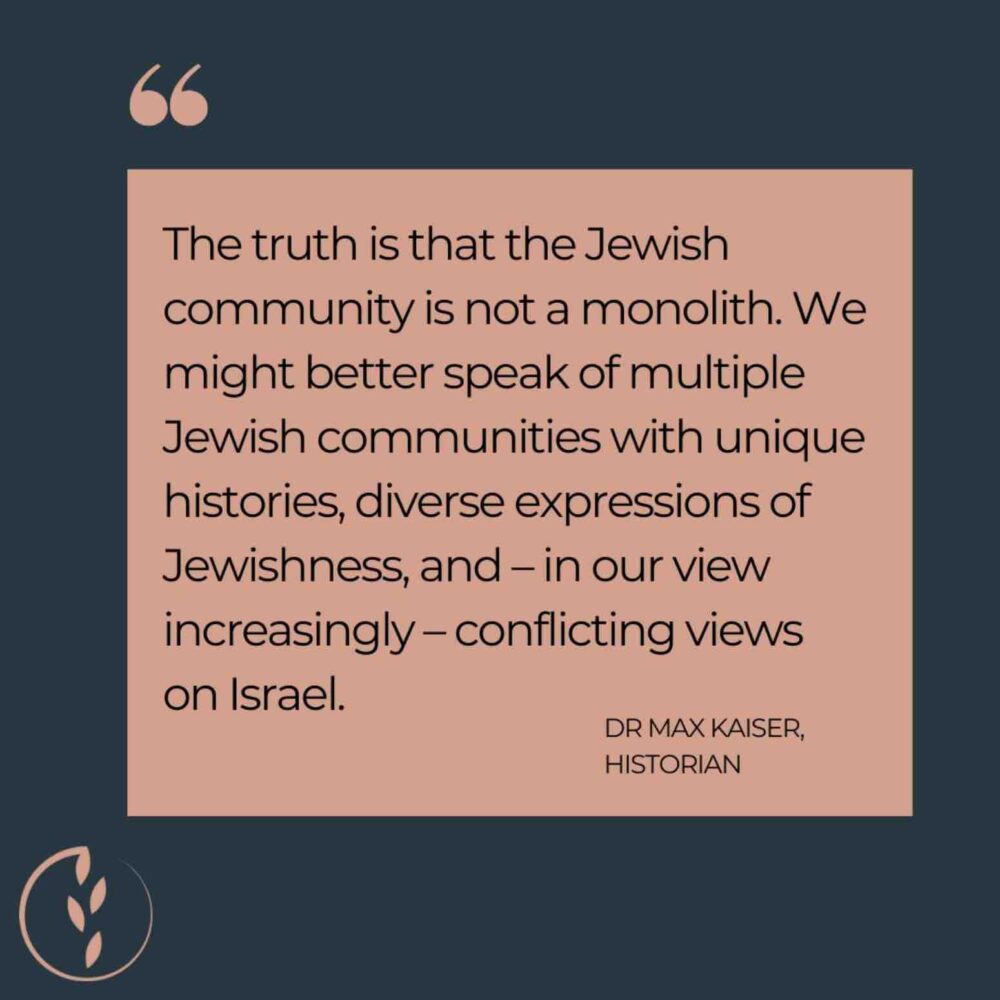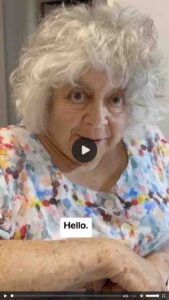A call for Australia to cut all military ties and sanction Israel

JVL Introduction
Stop press: 7th April 2024. We have added a powerful video statement in support by Miriam Margoyles.
indictment ofThe Jewish Council of Australia is a new grouping, hoping to provide an alternative perspective to the conservative organisations that claim to represent the Australian Jewish community.
It has just issued a statement calling on state and federal governments in Australia to immediately cut all military ties and place sanctions on Israel amid the escalating violence in Gaza.
It is a welcome initiative at a time when there is growing dismay at Israel’s wilful slaughter of the people of Gaza and blatant disregard for the decisions of the International Court of Justice.
We post below the media statement of the JCA, followed by Daisy Dumas in the Guardian who places the JCA in Australia’s radical Jewish tradition.
RK
Australia must cut all military ties and place sanctions on Israel
Media statement, April 2, 2024
The Jewish Council of Australia calls on state and federal governments in Australia to immediately cut all military ties and place sanctions on Israel amid the escalating violence in Gaza. On 28 March, the International Court of Justice ordered additional provisional measures in the case brought by South Africa against Israel for violating the Genocide Convention. Three days earlier, the UN Security Council voted for an immediate ceasefire in Gaza.
In light of these developments, and the worsening conditions imposed on Palestinians in Gaza, in particular the spread of starvation due to Israel’s blockade of aid, we urge the Australian Government to do everything in its power to stop Israel committing the crime of genocide. The Australian Government should be using all available forms of diplomatic pressure, including sanctions and travel bans on extremist settlers and those suspected of war crimes . Today’s tragic news that an Australian aid worker has been killed by an Israeli air strike deepens the need for a stronger response from our government.
The ICJ has ordered Israel to “[t]ake all necessary and effective measures to ensure, without delay” the “unhindered provision at scale” of basic services and humanitarian aid—including food, water, electricity, fuel, shelter, clothing, hygiene and sanitation products, and medical supplies and care to the people of Gaza.
This order has legal implications for Australia, which must comply with its obligations under the Genocide Convention by taking all reasonable measures to ensure Israel allows aid into Gaza and to achieve an immediate ceasefire.
The ICJ’s additional provisional orders are a clear sign that the situation in Gaza has drastically deteriorated. Palestinians face death by Israeli assassinations, bombardment, and now, forced famine. The images emerging today of Israel’s total destruction of Gaza’s Al-Shifa Hospital, together with the news that Israel has killed an Australian aid worker, ought to force governments like ours to take concrete action. The world cannot stand idly by in the face of such horrific cruelty.
Australia must heed the additional provisional measures ordered by the ICJ and do everything in its power to prevent Israel committing the international crime of genocide by killing, mass starvation and disease, including imposing sanctions and cutting military ties. In particular, Australia must end its role in supplying weapons parts to Israel, and throw its weight behind a global arms embargo.
Dr Max Kaiser, historian and Executive Officer of the Jewish Council of Australia
With each passing day, it becomes clearer that Israel is a rogue state. We say this as part of a large and growing number of Jews – in Australia and around the world – who have been calling for a ceasefire for many months, and saying that Israel’s actions are completely incompatible with our Jewish values. Opposing this genocide is an expression of our Jewishness and an honouring of our ancestors who were themselves the victims of genocide and racist violence.
It is clear that Israel will not listen to the international community until there are consequences for its actions. The Australian Government has all the tools necessary at its disposal, including sanctions and travel bans on suspected war criminals, which it has deployed against Russia. All that is missing is the political will.
Media contact: 0493 970 412
jewishcouncil@jewishcouncil.com.au
A fresh Jewish voice: the new Australian group opposing antisemitism – and Israel’s conduct
Daisy Dumas, the Guardian, 31 Mar 2024
The Jewish Council of Australia hopes to offer an alternative view to the conservative organisations that claim to speak on behalf of a diverse community
The newly minted Jewish Council of Australia may be a product of the Israel-Gaza war but the group of progressive Jewish academics, teachers, writers and lawyers is continuing a long tradition.
“There have always been progressive threads in the Jewish community in Australia,” says the historian Max Kaiser, an executive officer of the council, which he co-founded in February. His grandfather was a member of the Jewish Council to Combat Fascism and Antisemitism, established in 1942. Before that, from 1928, there was the Jewish Labor Bund in Melbourne, born as an outpost of the largely Yiddish-speaking socialist movement in eastern Europe (and still active).
“At different stages of Australian Jewish history there have been different organisations that have taken up that mantle,” Kaiser says.
The mandate of the new council, led by Kaiser, Sarah Schwartz and Elizabeth Strakosch, all in their mid-30s to early 40s, is to combat antisemitism and racism in Australia – and to provide an alternative perspective to the organisations that claim to represent Australian Jews.
“We came together because of the abject failures of many of our Jewish representative organisations in Australia to truthfully portray the Jewish community as being diverse,” says Schwartz, a human rights lawyer. “[Those organisations have failed] to portray Jewish people who are critical of Israel’s conduct, particularly at this time in Gaza.”
Like Strakosch and Kaiser, she volunteers her time and the group has no external funding.
They say the dominant voices in the Jewish community have come from the conservative Executive Council of Australian Jewry, the umbrella body for state-based representative bodies, and a handful of what they see as rightwing political groups.
The ECAJ adheres to and encourages the adoption of the International Holocaust Remembrance Alliance definition of antisemitism, which states in part: “Manifestations [of antisemitism] might include the targeting of the state of Israel, conceived as a Jewish collectivity. However, criticism of Israel similar to that levelled against any other country cannot be regarded as antisemitic.”
If [antisemitism] gets weaponised to shut down Palestinian voices, it becomes much harder to call out real antisemitism
Elizabeth Strakosch
It is the definition that Strakosch’s workplace, the University of Melbourne, has adopted, raising what the political scientist calls “problematic implications” around academic freedom while weakening the charge of “actual” antisemitism.
“If [antisemitism] gets weaponised to shut down Palestinian voices, it becomes much harder to call out real antisemitism, which I feel is growing in a number of ways,” she says.
Since the terrorist attacks on Israel by Hamas on 7 October and Israel’s retaliatory bombardment of Gaza, antisemitic incidents in Australia have multiplied, with the ECAJ recording a 482% increase in the seven weeks after the attacks.
But Strakosch says the harassment of Jews has come from fervent supporters of the Israeli government among the Jewish community as well as from “more blatant and openly violent” neo-Nazis.
At the same time, some Australian Jews have called for a ceasefire in Gaza, reflecting US Jewish movements that are critical of Israel. Jewish groups in Australia including the Tzedek Collective and Jews Against the Occupation have staged sit-ins and protests against war in Gaza – and the council believes the sentiment is growing, particularly among young people.
“Most Jews our age and younger do not read the Australian Jewish News, do not know who the head of the Jewish Community Council of Victoria is, have no real buy-in into those [conservative] institutions,” Kaiser says.
But while the council has also enjoyed what he calls “unexpected” and “overwhelming” support from older people and those who feel they are unable to speak out against Israel publicly, they were prepared for a backlash from the organisations they exist to counter.
In an op-ed for the Jewish Independent (the liberal Jewish platform formerly known Plus61J), Schwartz and Kaiser wrote that Jewish representative leaders had criticised the council – some of whose committee members are descended from Holocaust survivors – in the weeks after its launch.
“One post said the council was formed to deny antisemitism, another said we ‘might as well join Hamas’ and a third, sent to a supporter, said ‘not surprised by your support of the Jew Haters Council of Australia’,” they wrote.
As an unelected voice that does not claim to be representative, the council has spoken out against “the vicious and escalating” assault on Rafah, withdrawal of Unrwa funding and the “moral bankruptcy” of neo-Nazis at a screening of the Holocaust film The Zone of Interest in Melbourne. It strongly supports an immediate ceasefire in Gaza but does not have a formal stance on a two-state solution.
Its advisory committee includes the director of the Adelaide writers’ week, Louise Adler, the academic and Israeli Australian citizen Dr Na’ama Carlin and the publisher and Stella prize co-founder Aviva Tuffield.
There is talk of joining forces with international groups to create a globally connected network of Jewish organisations that support Palestinian freedom, while locally the council plans to work with interfaith groups and politicians.
Strakosch says antisemitism cannot be singled out as a form of racism that is not connected to other forms of it, such as that towards Australia’s Indigenous people.
Kaiser, like his grandfather, is responding to a constantly shifting political landscape. With the ebb and flow of progressive and conservative views of Israel come moments of deep polarisation within the community.
“Particularly around times of war … the right takes up a lot of space,” Kaiser says. “A lot of Jews like ourselves are very, very uncomfortable about that.”


I haven’t read all the above so this is a partial reply. My problem is that I always block at the phrase ‘Jewish values’, although the writer above does qualify it with ‘*Our* Jewish values’. Most religions are a bit of a pick’n’mix affair for their adherents.. In the case of Judaism it seems a constant dialogue between post-Enlightenment thinking and a Bronze Age ethics and primitive metaphysics. Most western contemporary Jews, unless I’m very mistaken, seem to take a broadly modern secular view of the world together with its morality and clap a ‘Jewish values’ label on it to maintain meaning and identity. Perhaps the most we can do about all the different ways of being Jewish in today’s world is to adapt Wittgenstein’s metaphor of family resemblance. Though often it’s a pretty faint one.
It’s great to hear of this new organisation emerging in Oz, and I hope JVL and JVP will connect to the Jewish Council of Australia. I have started sending out feelers to long-lost Australian connections in the hope that some of them might be involved. If I hear anything I will let JVL Committee members know.